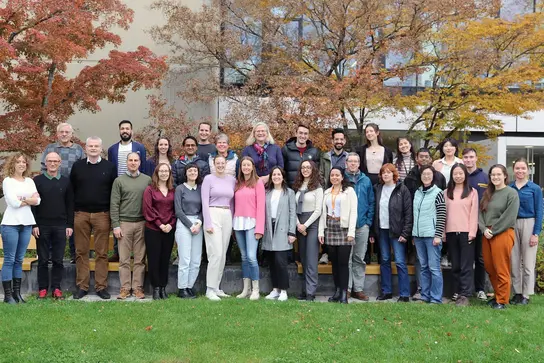Cancer Epigenomics
- Functional and Structural Genomics

Prof. Dr. Christoph Plass
Division Head
Our division studies the contribution of epigenetic modifications to cancer, from their role in promoting tumor growth to their modulation of cancer therapies. Non-genetic mechanisms of therapy resistance are poorly understood at the molecular level and represent an unmet clinical need that we are addressing in several projects.

Our Research
The Division of Cancer Epigenomics focuses on the integration of epigenomic, genetic and transcriptomic data to unravel epigenomic alterations contributing to human malignancies, with a focus on acute myeloid leukemia, chronic lymphocytic leukemia, breast, lung, and prostate cancer. Altered epigenetic regulation of gene expression through changes in DNA methylation patterns, histone modifications and nucleosome positioning has been identified as a tumorigenic mechanism in almost all human malignancies. Epigenetic gene regulation through modulation of enhancer activity is now recognized as a novel concept in cancer epigenomics. Epigenetic modifications do not alter the gene sequence and offer the exciting possibility of using inhibitors of epigenetic enzymes to revert them. Our work relies on the use of state-of-the-art technologies, including genome-wide epigenomic profiling of purified cell types using low-input protocols, single-cell technologies, long-read sequencing and sophisticated computational analyses of omics data.
B370 team

Methods
Selected Publications
Guokun Zhang, Vindi Jurinovic, Stephan Bartels, Matthias Christgen, Henriette Christgen, Leonie Donata Kandt, Lidiya Mishieva, Hua Ni, Mieke Raap, Janin Klein, Anna-Lena Katzke, Winfried Hofmann, Doris Steinemann, Ronald E. Kates, Oleg Gluz, Monika Graeser, Sherko Kuemmel, Ulrike Nitz, Christoph Plass, Ulrich Lehmann, Christine zu Eulenburg, Ulrich Mansmann, Clarissa Gerhauser, Nadia Harbeck, Hans H. Kreipe
Etienne Sollier, Anna Riedel, Umut H. Toprak, Justyna A. Wierzbinska, Dieter Weichenhan, Jan Philipp Schmid, Mariam Hakobyan, Aurore Touzart, Ekaterina Jahn, Binje Vick, Fiona Brown-Burke, Katherine Kelly, Simge Kelekçi, Anastasija Pejkovska, Ashish Goyal, Marion Bähr, Kersten Breuer, Mei-Ju May Chen, Maria Llamazares-Prada, Mark Hartmann, Maximilian Schönung, Nadia Correia, Andreas Trumpp, Yomn Abdullah, Ursula Klingmüller, Sadaf S. Mughal, Benedikt Brors, Frank Westermann, Elias Ulrich, Robert J. Autry, Matthias Schlesner, Sebastian Vosberg, Tobias Herold, Philipp A. Greif, Dietmar Pfeifer, Michael Lübbert, Thomas Fischer, Florian H. Heidel, Claudia Gebhard, Wencke Walter, Torsten Haferlach, Ann-Kathrin Eisfeld, Krzysztof Mrózek, Deedra Nicolet, Lars Bullinger, Leonie Smeenk, Claudia Erpelinck-Verschueren, Roger Mulet-Lazaro, Ruud Delwel, Aurélie Ernst, Michael Scherer, Pavlo Lutsik, Irmela Jeremias, Konstanze Döhner, Hartmut Döhner, Daniel B. Lipka, Christoph Plass
Michael Scherer, Indranil Singh, Martina Maria Braun, Chelsea Szu-Tu, Pedro Sanchez Sanchez, Dominik Lindenhofer, Niels Asger Jakobsen, Verena Körber, Michael Kardorff, Lena Nitsch, Pauline Kautz, Julia Rühle, Agostina Bianchi, Luca Cozzuto, Robert Frömel, Sergi Beneyto-Calabuig, Caleb Lareau, Ansuman T. Satpathy, Renée Beekman, Lars M. Steinmetz, Simon Raffel, Leif S. Ludwig, Paresh Vyas, Alejo Rodriguez-Fraticelli & Lars Velten
Katherine Kelly, Michael Scherer, Martina Maria Braun, Pavlo Lutsik & Christoph Plass
Get in touch with us




